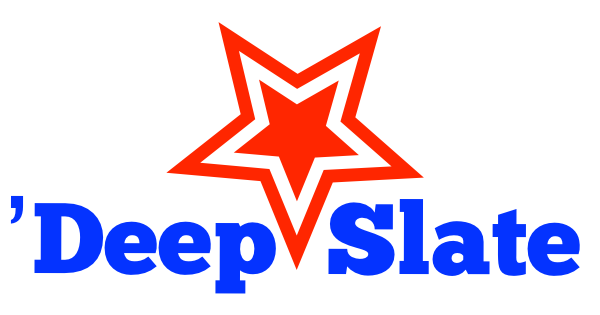
UPDATED 11/14/16 WITH RESULTS as of now 😱 (still subject to change)
ED NOTE: After 7 days of writing, this post is finally finished.  welcome to my voter guidezzzz.zzzz….zzz.zzzz  OWWW!
Ugh-oh-matic. 42 ballot measures. I hate ballot measures – they fly in the face of the value of a representative democracy. 42? GACK.
If you’re wondering why this happens, it’s because everyone knows that presidential election years are when the most voters turn out. That means everyone who thinks high voter turnout will help them get something through, or is just looking to make a name for themselves, jumps on board.
Anyway, I’d whine and moan more, but I have a ridiculous amount of writing to do, and better get cracking. You, dear reader, should go use the bathroom, put on your comfy pants, and settle in for a long read.
Here we go…
Regardless, GO VOTE!
‘deep
.ps: Let’s start a new tradition: #votingstickerselfie AFTER YOU VOTE: Take a pic with your voting sticker on your nose & hashtag it as #votingstickerselfie!
.pps If you…
- like what you read, please do let me know! Also questions, criticisms, comments welcome!
- want to know where to vote, jump to the Extras below
- want to get an email when I post the next ‘Deep Slate, just email me!
WHAT IS THIS?:
Every San Francisco election cycle since sometime in the ‘90s, I write up one of these posts, my voting guide, which I megalomaniacally call the  “‘Deep Slate.â€
The format of this post is as follows:
- The LIST: the simple list of my endorsements for this election.Â
- The DETAILS: the whys and wherefores of each endorsement. This is how I arrived at each position.
- My VALUES: a brief explanation of my values and sources, to help make sense of my opinions.
- Sources: a collection of my sources and a tiny bit about how I arrive at my endorsements.
- Extras: If you want to know where to vote, or want to find older ‘Deep Slates….
Also note that a few days after the election, you can come back & check the RESULTS by clicking here.
THANKS:
Thanks, as always, to the number of folks who have asked me for my opinions. I know I say it every time but it is quite true: I really am honored by your interest.
And big props to my lovely wife, for proofreading this and also for being so supportive of all my meetings & involvements!
So without further preamble, let’s dive in!
THE LIST:
Note: If you just want this list as a handy, printable text version, just click here.
FEDERAL:
President: Hillary Clinton / Tim Kaine LOST (Donald Trump / Mike Pence)
U.S. Senate: Kamala Harris WON
U.S. Representative: Nancy Pelosi WON
STATE:
C.A. Senate: Scott Wiener WON
C.A. Assembly, D17: David Chiu WON
C.A. Assembly, D19: Phil Ting WON
Prop 51: School Bonds: no PASSED
Prop 52: Medi-Cal Hospital Fee: Yes PASSED
Prop 53:Â Revenue Bond Vote: NO NO NOÂ DID NOT PASS
Prop 54: Legislative Transparency: Yes PASSED
Prop 55:Â Upper Income Tax Extension for Education & Healthcare: YESÂ PASSED
Prop 56:Â Cigarette Tax Increase: YESÂ PASSED
Prop 57:Â Criminal Sentencing Reform: YESÂ PASSED
Prop 58:Â English Language Learning: YESÂ PASSED
Prop 59: Anti-Citizen’s United Statement: Yes PASSED
Prop 60: Condoms in Porn: No DID NOT PASS
Prop 61: Prescription Drug Purchasing: No DID NOT PASS
Prop 62:Â Repeal the Death Penalty: YESÂ DID NOT PASS
Prop 63:Â Gun Control (Ammunition) improvements: YESÂ PASSED
Prop 64:Â Marijuana Legalization: YESÂ PASSED
Prop 65:Â Carry Out Bags: NOÂ DID NOT PASS
Prop 66:Â Death Penalty Enforcement: NOÂ PASSED
Prop 67:Â Plastic Bag Ban: YES YES YESÂ PASSED
JUDICIAL:
Judge: Paul Henderson LOST (Victor Hwang)
SAN FRANCISCO:
School Board: Matt Haney (YES!), Jill Wynns, Stevon Cook, Mark Sanchez (Haney, Cook, Sanchez & Rachel Norton WON, Wynns LOST)
Community College Board: Rafael Mandelman (YES!), Tom Temprano, Shannell Williams, Amy Bacharach (Williams, Mandelman, Temprano & Alex Randolph WON, Bacharach LOST)
BART Director: Gwyneth Borden LOST (Bevan Dufty)
BART Director: Lateefah Simon WON
Supervisor D1: Andy Thornley LOST (Sandra Lee Fewer)
Supervisor D3: Aaron Peskin WON
Supervisor D5: London Breed WON
Supervisor D7: Norman Yee WON
Supervisor D9: Hillary Ronen WON
Supervisor D11: Kim Alvarenga LOST (Asha Safai – could change)
Prop A:Â School Bonds: YESÂ PASSED
Prop B: City College Parcel Tax: Yes PASSED
Prop C:Â Repurpose Unused Funds for Affordable Housing: YESÂ PASSED
Prop D: Force immediate elections for elected vacancies : No DID NOT PASS
Prop E:Â Budget Set-aside for Street Trees: YESÂ PASSED
Prop F: Allow 16yr olds to vote in local elections: Yes DID NOT PASS
Prop G:Â Improve Police Oversight: YESÂ PASSED
Prop H:Â Create Public Advocate Position: NOÂ DID NOT PASS
Prop I: Budget Set-aside for Seniors: No PASSED
Prop J:Â Increase Sales Tax for Transportation & Homeless Services (Pt.I): YES YES YESÂ PASSED
Prop K:Â Increase Sales Tax for Transportation & Homeless Services (Pt.II): YES YES YESÂ DID NOT PASS
Prop L:Â Change Appointments & Budgeting for the Municipal Transportation Agency: NOÂ DID NOT PASS
Prop M:Â Restructure the Mayor’s Office of Economic Development & Mayor’s Office of Housing: NOÂ DID NOT PASS
Prop N: Non-Citizen Voting for School Board: Yes PASSED
Prop O: Exemptions for Candlestick Point Office Development: No PASSED
Prop P:Â Require At Least 3 Bids for Affordable Housing Projects: NO NO NOÂ DID NOT PASS
Prop Q: Prohibit Homeless Sidewalk Tent Encampments: No PASSED
Prop R: Neighborhood Crime Unit: no DID NOT PASS
Prop S: Hotel Tax Allocation for Homeless & Arts: no PASSED
Prop T: Prohibiting Lobbyist Contributions: Yes PASSED
Prop U:Â Change the Income Eligibility for Affordable Housing Designation : NO NOÂ DID NOT PASS
Prop V:Â Soda Tax: YES YES YESÂ PASSED
Prop W:Â Real Estate Transfer Tax: YESÂ PASSED
Prop X:Â PDR Building Protection : NOÂ PASSED
Prop RR:Â BART Safety & Reliability Bond: YES YES YESÂ PASSED
Again, if you want these as a handy, printable list, just click here.
THE DETAILS:
FEDERAL:
President: Hillary Clinton / Tim Kaine
Wow. There is so much I could say here. I could write a bunch of paragraphs on why I really admire Hillary Clinton & what I make of her various faults as well. I could write a bunch of paragraphs about serious policy points I disagree with Donald Trump on. I could also write about what a VAST NUT JOB / THREAT TO OUR DEMOCRACY / SERIOUSLY DANGEROUS AUTHORITARIAN Donald Trump is. Instead, I’ll just give you some of my favorite links:
The New York Times endorsement:
“Our endorsement is rooted in respect for her intellect, experience, toughness and courage over a career of almost continuous public service, often as the first or only woman in the arena.”
Â
A great Slate article on my biggest knock on HRC – her Iraq vote:
“In response, Clinton acknowledged, as she has on previous occasions, that she’d made a mistake. But she also offered an explanation for her vote, something she has rarely done in the past. …. In other words, Clinton was now claiming she voted the way she did in the interests of diplomacy; the problem was that Bush went back on his word—he invaded before giving the inspectors enough time. Listening to her rationale Wednesday night, I didn’t know whether she was telling the truth…. Looking up those details now, I have come to a conclusion about the rationale she recited at the New Hampshire town hall: Hillary was telling the truth”
I really think we SHOULD talk about why she is so unpopular.:
The sexism is less virulent now than it was in 2008, she said, but still she encounters people on rope lines who tell her, “ ’I really admire you, I really like you, I just don’t know if I can vote for a woman to be president.’ I mean, they come to my events and then they say that to me.â€
This video from Joss Whedon (my master!) NAILS IT!
And we’ll just end with something from President Obama:
There has never been a man or a woman, not me, not Bill, nobody, more qualified than Hillary Clinton to serve as president of the United States of America… I hope you don’t mind, Bill, but I was just telling the truth, man.
Â
 I volunteered a LOT with Clinton/Gore in ’92 here in SF, and so in ’93 a bunch of us got to go meet the new First Lady 🙂 )
I volunteered a LOT with Clinton/Gore in ’92 here in SF, and so in ’93 a bunch of us got to go meet the new First Lady 🙂 )Â
U.S. Senate: Kamala Harris
Here is what I wrote back in June for the primary & it covers it nicely:
Kamala Harris is a major California politican who I honestly haven’t followed too closely, but many people I respect hold her in really high regard. She’s much smarter and more capable than the her best Democratic challenger, Loretta Sanchez, and she has my vote.
U.S. Representative: Nancy Pelosi
The good thing about Nancy Pelosi’s longevity in Congress is that I can keep recycling stuff I’ve written before about her (this from back in 2014):
Nancy Pelosi is practically unopposed and she does really pretty well at the Federal level. No, she doesn’t completely represent my values, but if you spend twenty minutes considering how much CRAY CRAY is in Congress these days, you’ll thank your yoga mat that someone who thinks even vaguely similar to San Francisco has any power in our nation’s capital. Done, move along.
STATE:
C.A. Senate: Scott Wiener
Ugh. I hate races between two great candidates. And what do I hate more than that? Races between two great candidates that devolve into mud-slinging smear fests. This whole thing makes me sad. But, how to vote? Here’s what I said in June:
This is the other race that I’m dreading being pilloried for, but at least I’m not torn. I really have a great deal of respect and admiration for both of these politicians, and Jane Kim is a personal friend. Either of them will be excellent legislators at the state level.
That being said, both of their politics are a bit cagey: Jane Kim has been more classically progressive, and while on housing she’s done great work, on other issues she’s been more centrist (Twitter tax break, Soda Tax). Scott Wiener is often attacked by the left as being a moderate/conservative (for San Francisco), or worse (due to his stand on homeless encampments for example) but has also been a real champion for transportation and sound city planning. Neither are perfect; they are also capable of taking politically expedient stands that I find horrible: Jane’s scapegoating “Google Buses” or her opposition to the Soda Tax or Scott’s vote against increasing public access to police disciplinary records or his championing of dog-walking in ecologically sensitive natural areas like Fort Funston. Nonetheless, they are also both super smart and super capable, so in the end, I think we really can’t lose with either of them in the State Senate.
For me, personally, it has been a difficult choice, because Jane is a friend and someone who I think the world of, but in the end, I’m going with Scott because as President of the SF League of Conservation Voters, I’ve worked with him a lot more on environmental and transportation issues that are near and dear to my heart, and I’m constantly impressed with his intelligence and his detailed, thoughtful and thorough approach to issues in the City (whether I agree with him or not.)
As several enviro friends have said to me “There is a clear choice: Scott.†I’m all in (see my editorial in the Examiner).
(The good news is we can’t lose – we’re going to have a great State Senator either way.)
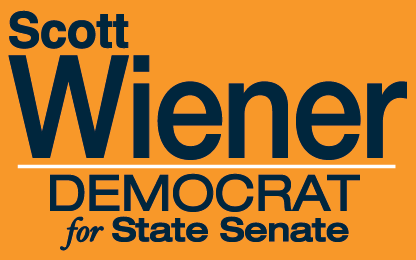
C.A. Assembly, D17: David Chiu
David is running largely unopposed and is a solid legislator. Done.
C.A. Assembly, D19: Phil Ting
Phil is also running largely unopposed, and was just awarded a Golden Wheel Award by the Bike Coalition for some of his excellent legislation. Done.
Prop 51:Â School Bonds: No
I read the voter guide and was all prepared to say “HELL YES” to school bonds, as I would for almost anything that supports education, but then I noticed that Governor Brown, who I generally like, was against it & thought “What the hell?” So as I did more research, it became pretty obvious that this is one of those things that points out why ballot measures suck. If you position it as,
SCHOOL BONDS. FUNDING FOR K-12 SCHOOL AND COMMUNITY COLLEGE FACILITIES. INITIATIVE STATUTE. Authorizes $9 billion in general obligation bonds for new construction and modernization of K-12 public school facilities;…
who else but a Republidiot would oppose it? It’s misleadingly phrased so decent-minded folks will say “Sure!” But digging into the details, you learn that this bond was put together by and for developers of school buildings like the California Building Industry Association. I like the San Jose Mercury’s takedown & this article from the LA Times because they touch on the environmental argument against Prop 51:
Unlike all the other school-bond measures placed on the ballot since the State Facilities Grant Program began in 1998, this one wasn’t put there by the Legislature with the governor’s approval. In fact, Gov. Jerry Brown hasn’t had anything good to say about Proposition 51. “I am opposed to the developers’ $9-billion bond,” he told The Times in February, referring archly to the construction industry’s role as the proposition’s main financier. Brown also argued that it would promote sprawl and continue an inequitable system based on which school districts get to the application line fastest, not which ones need it the most.
The Legislative Analyst’s Office had an even more critical view of the current approach to funding school construction in its 2015-16 budget report. “Notably,” it said, “the existing program fails to treat school facility costs as an ongoing expense despite the recurring nature of facility needs, allows disparities based on school district property wealth, fails to target funding according to greatest need, results in excessive administrative complexity, and lacks adequate accountability mechanisms.” Ouch. But that was just the start. The report went on to point out that as long as there is money in the state fund, developers of big new housing projects don’t pay more than half the cost of building the schools necessary to serve those homes. That extra subsidy for new construction at a time when many existing schools are underutilized only encourages the sprawl that has been an environmental and resources drain on the state.
In looking at all the “yes†endorsements this measure has gotten, I’m thinking it is a measure that’s hard to oppose because “being against schools†is politically toxic, which leads us back to why I hate bond measures. Don’t believe the hype. Vote No.
Prop 52:Â Medi-Cal Hospital Fee: Yes
This is a fairly straightforward (though terribly wonky) fee that private hospitals pay to help support Medi-Cal. It is expiring and needs to be extended, which it has been done several times before. Important. Uninteresting. Yes. Â
UPDATE on 52: David Glasser (in the comments section below) and Matthew Bain on Facebook  both point out that this measure is changing the State Constitution to make this fee set up structural and thus requiring a 2/3 vote of the public to change it.  My position stands, but it is an interesting take.  Read more here & here if you are interested.
Prop 53:Â Revenue Bond Vote: NO NO NO
The heinous Prop 13 was one grand example of CA shooting itself in the head, and this would be another. However, this is nowhere near as far reaching, in that it only really effects LARGE projects (like High Speed Rail…. MUST. GET. TRAINS.). Nonetheless, it is a similar attempt to be our own worst enemy. Simply put, this will make it harder to create large, revenue-producing projects by requiring a very high electoral bar, a 2/3 statewide vote, for revenue-generating bonds. So, say if we in the Bay Area wanted to float a large bond, perhaps to build a BART tunnel or something, voters in Orange County would have a say, even though it is practically irrelevant to them. Why is this a good idea? This measure is only on the ballot because a single Central Valley farmer spent $4.5 million dollars to get it here. This is not how public policy should be made.
“The problems with initiatives like this one are almost too many to list. Instead of a real seasoning before legislators and state officials, there’s only one author. Clearer language and attempts at compromise are ignored. If it proves disastrous, it can’t be amended or repealed without another public vote,”
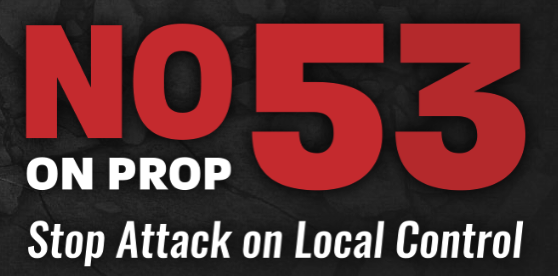
Prop 54:Â Legislative Transparency: Yes
This bill mostly does two things:
- Requires the text of legislation to be voted on be published 72hrs in advance
- Requires the Legislature to record all its public meetings & post them within 24 hours
These seem to be good things. Evidently, many bills get rushed through and voted on with very little reading by our legislators because amendments and riders get tacked on hastily at the last minute (from the SF Chronicle):
Examples abound of the legislative leadership bypassing the normal public process to do the bidding of a special interest. There was that budget measure that limited the amount of reserves local school districts could maintain as a cushion against lean times (a gift to the teachers union, which wanted to make those dollars available for immediate spending); the 2009 waiver of environmental rules for a downtown Los Angeles football stadium (on the argument that time was of the essence to secure an NFL team … the project never broke ground); or the 2011 bill that Democrats rushed through to force all voter initiatives on the November ballot, thus breaking a deal with Republicans to put spending reform on the June 2012 ballot.
A varied coalition of folks, including the League of Women Voters and all the major newspapers in CA support this, while a smaller group of folks, including the Democratic Party, oppose, mostly on the ground that this could have the consequence of giving more time to special interests to lobby laws. But frankly, that argument doesn’t make a lot of sense to me, and even if they are right, protecting us from lobbyists by making legislation more obscure to vote on is just kinda insane. I agree with all the newspapers… Yes.
Prop 55:Â Upper Income Tax Extension for Education & Healthcare: YES
In 2012, during the big fiscal meltdown, we approved a small tax on folks with incomes over $250K, to help with the budget. It is expiring. This measure would extend it for another 12 years. If it is extended, in good years it is expected to raise $9 billion, and in bad $4 billion. Half of this money would go to schools & community colleges, a bunch to Medi-Cal and the rest to the rainy day fund & debt payments. This is a BIG YES.
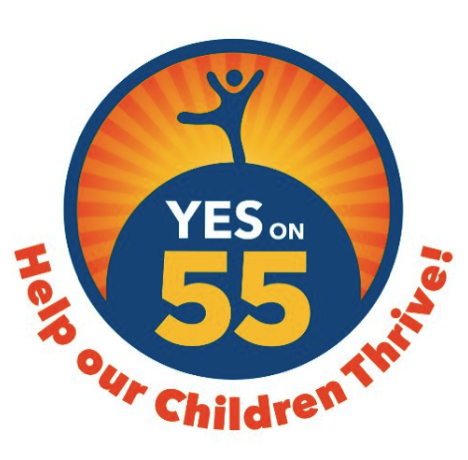
Prop 56:Â Cigarette Tax Increase: YES
The current tax on cigarettes is $0.87 a pack, and does not cover the latest noxious cancer-vector: e-cigs. This knocks the tax up to $2.87, and includes e-cigs. If that seems like a lot, remember that California taxpayers spend $3.58 BILLION every year— $413 per family, whether they smoke or not—paying medical costs of smokers. The funds will go primarily to state health programs. DONE. YES.
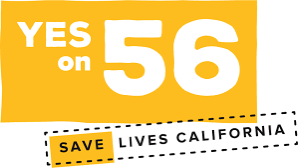
Prop 57:Â Criminal Sentencing Reform: YES
One of the most shameful things about California is our prison-industrial complex. In 2009 & 2011, the US government ordered us to reduce our prison population. The Supreme Court ruled that California prisons were overcrowded and violated the Eighth Amendment’s protection against cruel and unusual punishment! This is a thoughtful measure designed to reduce that load by allowing possible parole for thousands of nonviolent felons. It would also help keep the problem from happening by giving judges, not prosecutors, the authority to decide whether juveniles should be tried as adults. And it allows prisoners to earn increased parole time for good behavior. Done and DONE. YES.
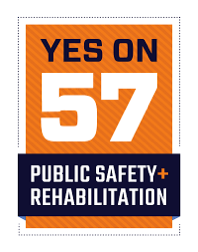
Prop 58:Â English Language Learning: YES
This measure allows schools, teachers & parents decide the best way to teach English to non-English speakers, rather than a statewide mandate to force most students to learn in English-only classes (which was created by Prop 227 in 1998). Different kids have different needs. YES.
Prop 59:Â Anti-Citizen’s United Statement: Yes
This is a “statement” vote in that it doesn’t do anything other than tell the world how California feels about the horrible Citizen’s United Supreme Court decision of 2010. In that decision, the Supreme Court ruled that corporations have the same First Amendment rights to free political speech as individuals do. And since donating money to campaigns is considered “free speech”, CU opened the floodgates of corporate money influencing today’s elections – can you say SuperPACs? It is long since time to stop this madness, and though this is only the tiniest step in that direction, it is still worth a Yes. (Also, if it fails, it might be a significant setback for the real work of getting a Constitutional Amendment overturning CU.)
Prop 60:Â Condoms in Porn: No
I <3 California. :-/ There is no reason this should be on the ballot. If there were a real workplace safety issue this was addressing (there isn't - the industry already has well functioning testing regimes) it would come in the form of safety regulations form Cal-OSHA. This is just stupid. Vote No. (There is much more that can be said about this, and if you care, the SF Chronicle does it well here as does Ballot.fyi.)
Prop 61:Â Prescription Drug Purchasing: No
Wow, this one makes my head hurt. This is evidently a well meaning attempt to rein in the outrageous cost of prescription drugs by forcing the state to only buy drugs at the heavily discounted rate the Veteran’s Administration gets (by federal law). Presumably this would apply market pressure on drug makers to lower their prices. Or…. it could do a host of other things that would be bad like incentivizing drug companies to stop offering some drugs to the VA, or to charge the VA more. No one really knows. Here’s a great quote from the LA Times:
As much as Proposition 61’s sponsors rail about drugmakers’ greed, however, they assume that the very same avaricious, monopolistic companies will do nothing in response to the squeeze on the industry’s profits if the measure passes — that somehow, scruples or lack of market power will stop them from compensating by raising the prices they charge private insurers, consumers and the VA itself. That’s either naive or magical thinking, and it’s why Proposition 61 deserves a no vote.
The excellent Ballotpedia article on 61Â presents some other useful tidbits:
- The state’s legal analysts can’t predict how much it will save the state on drug costs, if any
- Millions and millions are pouring in on both sides, making this one of (if not the) most expensive ballot initiative campaign in California history
- The mix of people for and against this is dizzying, with groups & people I trust and distrust on both sides. (Though it must be said, more groups I trust are “Yes”, and more groups I distrust on the “No” side – with me! Like the drug companies – eeek.)
So what to do? Look, the problem of out of control drug prices is as near as your nearest kid with an EpiPen, so this is a problem that desperately needs to be solved. I get that the drug companies’ big bucks have made this really difficult to solve at the legislature, but with this many unknowns and this big of a deal, I think we should vote no until a better proposal gets hammered out. First do no harm. Vote no.
(Ed. note: I’d like to give a shout out to the League of Pissed of Voters voting guide for their thoughtful write up, which got me to change my mind about this one.  Nice work!)
Prop 62:Â Repeal the Death Penalty: YES
If you believe that our court system and government are infallible, you should vote NO on 62. If you feel otherwise, you should vote YES.
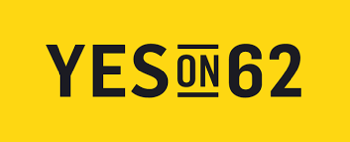
Prop 63:Â Gun Control (Ammunition) improvements: YES
EASY. Requires background checks for purchasing ammunition and creates a process to remove guns from felons and people convicted of domestic violence. Honestly, this measure shouldn’t need to be on the ballot – it could be done at by the legislature. But since this is an attempt to do an end run around the massive lobbying might of the NRA, I get why we have to vote for simple sanity. DO IT. YES.
Prop 64:Â Marijuana Legalization: YES
I’ve said this about marijuana legalization for years: either make pot legal, or make alcohol illegal, but do one or the other because they seem to be similar on the harm/benefit scale. Since alcohol isn’t going anywhere, I say legalize pot & let’s be done with it. Two simple reasons: tax revenue & environmental protection. By making pot legal & thus taxable, the state stands to eventually start making somewhere around $1 billion a year in taxes, and reap millions of more in savings on enforcement. WIN. For me, the bigger win is environmental: growing illicit marijuana damages state and national parks in California, as the SF Chronicle puts it:
[Marijuana farming] has wreaked significant environmental damage from clandestine operations that divert water from streams, use chemicals and otherwise tamper with the ecosystem away from regulators’ scrutiny.
In fact, the California League of Conservation Voters has come out big for it, especially since 20% of the funds raised by Prop 64 will go to environmental cleanup & remediation of public lands effected. This is just good, sane policy. HELL YES.
Prop 65:Â Carry Out Bags: NO NO NO
This is a DEEPLY CYNICAL attempt to dismantle California’s AWESOME plastic bag ban… Details below in the Prop 67 section, but just know that the San Jose Mercury News nails it:
And vote no on Proposition 65, one of the most disingenuous ballot measures in state history — and that’s saying something.
Vote HELL NO on Prop 65.
Prop 66:Â Death Penalty Enforcement: NO
One of the standard (and true) arguments against the death penalty is the cost. It goes like this: when you factor in the costs of all the trials and legal processes needed to make sure we are not executing innocent people with the death penalty, you eventually realize it is cheaper to just give them life sentences. This measure attempts to “fix” this problem by “streamlining” and essentially reducing the legal processing of these cases to reduce expense. This is folly, you’re really just making it easier to execute innocent people (which already happens). I like what the SF Chronicle said in their opposing editorial:
Prop. 66… proposes a highly complex, probably very expensive and constitutionally questionable scheme for streamlining the appeals process in hopes of shaving years off the timeline between conviction and execution.
Vote NO.
Prop 67:Â Plastic Bag Ban: YES YES YES
These measures are so deceptive, it is SO FUCKED UP. 65 in particular, which reads like a pro-environment law, is SUPER CYNICAL and EVIL. Honestly the best write up I’ve seen of this is from Ballot.fyi, and they do a better job of explaining it than me (and pointing out how it is even worse than I’m saying) so really you should read that, but I’ll attempt a shorter version here:

Back in 2014, California became the first state to pass a landmark sea-critter-saving plastic bag ban, SB270, which should have gone into effect last summer. Part of the deal made with merchants (who opposed 270) was that they could instead sell paper & reusable bags at least $0.10 or more & they would get to keep the money. All was well, except that the plastic bag companies are PISSED and SCARED. So they have cynically put both 65 & 67 on the ballot (@#%$^*&), in hopes that the voters dismantle the plastic ban in one of a few ways. The most obvious two are: if 65 passes (& gets more votes than 67), it will send the money raised from the bags into an environmental cleanup fund, but it will bleed away the support of the grocers, whose support is critical to make all this work. THAT is why 65 uses all the pro-environment language. With 67, the plastic bag companies have another shot at killing the plastic bag ban – if 67 fails to pass, the statewide ban doesn’t go into effect (local ones, like SF’s would still apply though – whew). Tell the plastic bag manufacturers WE SEE THROUGH YOUR BS: VOTE NO on 65 and YES on 67.
![]()
JUDICIAL:
Judge: Paul Henderson
Here is what I wrote in June for the primary:
From what I’ve read we have two largely competent and progressive candidates for judge, Hwang and Henderson. I’m leaning Henderson, because the opportunity to put a black, gay man behind the bench, given all that our justice system struggles with is an opportunity too good to pass up.
And that all still stands. It is perhaps remarkable that most of the progressive community supports Hwang, while more of the City’s moderates support Henderson. I could lean that way, but honestly, I didn’t like what the Guardian said about Hwang, even though they endorsed him, and so I’ll stand pat.
Â
Holy Jeebus.  That was just the State stuff.  Now we dive into SF.  You’ll need something to cleanse your head:
Â
SAN FRANCISCO:
School Board: Matt Haney (YES!), Jill Wynns, Stevon Cook, Mark Sanchez
Matt is good people, and Mark Sanchez I’ve interviewed many times. In addition to lots of experience on the Board and as a Principal, he’s a good fit. Wynns and Cook are respected an endorsed by many people I trust, so lets do it. (Note: this is a race I don’t know lots about and have gone with endorsements of people I trust.)
Community College Board: Rafael Mandelman (YES!), Tom Temprano, Shannell Williams, Amy Bacharach
Rafael has has been a great College Board member – he has really lead the charge on saving CCSF. This is a race I don’t know lots about and have gone with endorsements of people I trust.
BART Director: Gwyneth Borden
My dear friend Tom Radulovich has been the prototype of what a BART Director for San Francisco should be, but alas, he’s stepping down & the void will be huge. Tom has endorsed Gwyneth Borden to succeed him & that’s all I need to know. VOTE BORDEN
BART Director: Lateefah Simon
Lateefah has impressed everyone who has interviewed her. She’s smart, dedicated, and has an impressive history as a community organizer. Here incumbent opponent, is by all accounts, a toad. Seriously, a horrible vote & impossible to work with. Vote Simon.
Supervisor D1: Andy Thornley
Andy is a long time Policy Director at the SF Bike Coalition. Since his many years at the SFBC, he has been working at the SFMTA. If I lived in D1, I’d be excited to support all his awesome transportation work. His campaign is a long shot (Sandra Fewer is likely to win) but I’m hoping he can make a good showing.Â
Supervisor D3: Aaron Peskin
Here is what I wrote about Aaron back in 2015 when he was last running:
I’m a big fan of Aaron Peskin. He’s really smart, cares deeply about issues I really care about (especially environmental ones, affordable housing, etc), is a really brilliant political tactician, and is a strong leader. While he’s not perfect – sometimes he doesn’t play well with others and can be a cantankerous bastard when he wants to – his last tenure on the Board was marked by strong leadership and really strong policy making. I really think the BoS could use Aaron back.
I’m still a fan, and he’s running practically unopposed. I do wish I had asked him more questions about the Passel of Lame though, as I’m sure he has a lot to do with them. I’m sure we’d have a good debate. :-/
Supervisor D5: London Breed
This was a tough one, and one I’ll likely come under fire for. D5 is among the City’s most progressive districts, and London Breed is among the most moderate of Supervisors. That said, she’s done some great things: her work on the Styrofoam ban and Clean Power SF has been first rate. On transportation she’s also been really good, reducing parking minimums, working to make Muni work for everyone, and good bike stuff. Here’s what the SF Bike Coalition said in their endorsement:
We are endorsing the incumbent London Breed, who has consistently supported smart, data-driven traffic enforcement and helped to move important bike projects like Masonic Avenue and Fell and Oak Streets forward to construction.
Her opponent, Dean Preston, has been a long time tenants activist, and a good one, but his development proposals often smack of anti-density NIMBYism. On the other hand he is endorsed by tons of people I trust – mostly because of all the (valid) concerns around tenant protection and displacement. So this was a tough call. In the end, I went with the person with the stronger environmental record. London Breed.
Supervisor D7: Norman Yee
Norman Yee has done some really good Vision Zero (traffic safety) work in a District that isn’t very progressive, which is saying something. He is a solid and respected vote, if not a particularly ground breaking one. Done.
Supervisor D9: Hillary Ronen
This is another tough one. Ronen is aide to Supervisor Campos, who has been a progressive stalwart, but he has also been HORRIBLY lame about MUNI improvements. Josh Arce, the other main candidate, has been a long time member of the Department of the Environment and has some proposals (like a 30th St BART Station with housing) that I like a lot. But I’ve heard from people I trust at the Dept of the Environment that Josh is difficult to work with, and is more about his ambition than about getting things done. In the balance, I’ll go with Ronen. Arce will get my second vote (though as the race will come down to these two, I doubt it will matter).
Supervisor D11: Kim Alvarenga
This is a race I honestly don’t know much about. I’m sorry. None of the main candidates came for their interviews with the SF League of Conservation Voters. I’ve heard horrible things about the frontrunner, Asha Safai, and pretty much everyone I trust is lining up behind Alvarenga, so I’ll go with her.
Prop A:Â School Bonds: YES
Bonds for seismic upgrades and modernization of schools, building two new needed schoolds, and general upkeep. This is what bonds are for. No brainer. YES
Prop B:Â City College Parcel Tax: Yes
SPUR’s excellent write up covers this in far greater detail (& explains the back story of the issues facing City College). But the short version is that City College, critical education infrastructure for San Franciscans, is in really difficult financial straits. San Franciscans fund City College through a parcel tax of $79 per piece of property. This measure would effectively extend and raise the current parcel tax to $99. Do it. Yes.
Prop C:Â Repurpose Unused Funds for Affordable Housing: YES
This is an easy one: almost 25 years ago, voters created a seismic retrofit fund, to the tune of $350 million, to make loans to property owners in the aftermath of Loma Prieta. There is a lot of that money left ($200 million), just sitting there, unused. This allows the City to use that money for the acquisition and rehabilitation of affordable housing. Done. YES. (A good, more detailed, write up is here at the SF League of Conservation Voters site.)
Prop D:Â Force immediate elections for elected vacancies : No
Prop D, is the first of four measures (D, H, L & M) that I think are particularly lame. Before I talk about D, I want to take a moment to address what is really going on with these four.
This passel of largely ill-advised measures is being pushed by the progressive wing of City politics, who I generally like – which makes it even more annoying, as these are smart people who should know better. The charitable interpretation is that they are trying to rein in some of the lame things our useless Mayor has done and continues to do, and they see his unpopularity as a vehicle to ram this stuff through. But I think changing the charter & rejiggering our political system due to one bad mayor is dangerous and short-sighted, and I generally disagree with all of them. SPUR goes even further, dropping a history lesson on the subject for those (like me), who don’t know better, and I agree with their take on these:
Attacks on the City Charter’s Balance of Powers: PROPOSITIONS D, H, L AND M
The distribution of power in San Francisco government is defined by its City Charter, the city’s constitution. In 1995, after years of work by SPUR and others, the voters adopted a new charter to replace the previous one, from 1932. Over time, the 1932 charter had become outdated and overly complex, with hundreds of incremental changes.* The primary purpose of the 1995 charter reform was to lay out clear lines of authority, responsibility and accountability between the commissions, the supervisors and the mayor to allow the city to act quickly and decisively as needs arose and to enable citizens to hold elected leaders accountable.
Ever since the 1995 charter passed, there have been piecemeal moves to chip away at the definition of roles, in particular to weaken the office of the mayor. The latest ad hoc efforts are the four charter amendments on this ballot that remove power from the office of the mayor and redistribute it to supervisors and newly proposed positions. These measures would create a public advocate position (Prop. H), split appointments to the SFMTA board between the mayor and the supervisors (Prop. L), put the management of two departments under a commission rather than the direct oversight of the mayor (Prop. M) and prevent a mayoral appointee to the Board of Supervisors from completing a term and standing for re-election (Prop. D).
SPUR is concerned by these piecemeal assaults on the City Charter and the lack of public input involved. Changes to San Francisco’s system of government ought to be undertaken inclusively and comprehensively, informed by a set of principles. Props D, H, L and M reflect political motivations and should not be enshrined in the city’s guiding document.
*San Francisco Select Committee on Charter Reform Records (SFH 32), San Francisco History Center, San Francisco Public Library
Now, with that preamble, we can discuss the first of the Passel of Lame, Prop D, which basically strips the mayor of the authority to appoint Supervisors when the seat has been vacated for whatever reason. Basically, this would force the City to hold an election in about four months after a vacancy. Oh and by the way it will retroactively apply to the current Board (more on that in a second.) These elections will very likely have nothing else on them but the one race, and will still cost the City about $350K to put on. So we will be frittering away money on dramatically low turnout election, which will be woefully unrepresentative and can lead to bizarre choices. Why is this even on the ballot? Oh wait… it applies to this November’s election too. The Board of Supervisors will be losing one Supe for sure – either Jane Kim or Scott Wiener – and thus the balance of power between the moderate wing & the progressive wing may well hang in the balance. The progressives don’t want the Mayor to be the one to appoint another “moderate” and thus here we are. Bad legislation to enshrine a political calulation into the charter. NO. And to be clear, I tend to much prefer the politics of the progressive block of SF, but this just isn’t right. Vote NO.
Prop E:Â Budget Set-aside for Street Trees: YES
While I’m skeptical of budget set-asides, I’m all in for ones like this one, where an important need is politically handicapped by the way our process works. Really, it’s hard to have people speak for the trees. 🙂 And while that is in actuality what it comes down to in some ways, here is a spot on write up from my friend and colleague at the San Francisco League of Conservation Voters, Elizabeth Stampe:
San Francisco has one of the smallest tree canopies of any major US city. Not only do trees help fight climate change globally by taking up carbon, they help us manage climate change with shade and insulation. Trees also make for a more walkable, livable and sustainable city.
Current city policy exacerbates our lack of trees by requiring property owners to maintain most street trees, and fix sidewalks buckled by trees, whether or not they have the resources to do it. Existing trees are harmed because of this policy, which also discourages people from planting new trees.
Proposition E fixes these problems in two ways:
– Prop E transfers responsibility for street and sidewalk maintenance back to the City. – Prop E dedicates funds for tree care by setting aside $19 million per year from the City’s General Fund. These dedicated funds include a specific allocation of $500,000 per year toward San Francisco Unified for tree maintenance at public schools. Until now, there has been little or no funding to support such efforts to create a safe, green, and pleasant environment for children, teachers, and staff.
It also includes enough funding to maintain 50,000 new trees. Prop E does not put money toward planting new trees, but there are many sources for that funding. Maintenance is the missing piece.
Though budget set-asides are not always a good government practice, there are times when they are an effective way to fund important city priorities that often lose out in budget battles.
The San Francisco League of Conservation Voters strongly supports Prop E for a greener, healthier city. Vote Yes on Proposition E.
In fact, I love <3 Prop E, so much I co-wrote a op-ed in the Examiner for it, with Laura Tam from SPUR. Check it out here if you’re interested. AND VOTE YES!

Prop F:Â Allow 16-year-olds to vote in local elections: Yes
Voting has been shown to be habit forming, so let’s get ’em early. Yes.
Prop G:Â Improve Police Oversight: YES
A small but important step to better police oversight: this measure clears up a conflict of interest when it comes to police accountability. The Office of Citizen’s Complaints investigates misconduct in the SFPD, but its’ budget is controlled by the Police Commission, which governs the SFPD. This measure would make the OCC financially independant of the Police Commission (also renaming it the “Department of Police Accountability.”) YES.
Prop H:Â Create Public Advocate Position: NO
Of the four measures that I’m calling the Passel of Lame (please read the section explaining why, up here in Prop D’s write up!) I find this one the most noxious. I can see a case for arguing that D & L will make things better & an argument that M won’t do much bad, but this one? All I can see here is political maneuvering at the expense of governance. GRRRR.
Prop H would create a new citywide elected office, public advocate, who would have the power to do things like review City programs, conduct audits of City departments, oversee the Whistleblower program and the Office of Citizens Complaints (which investigates complaints against the SFPD) and conduct investigations, issue subpoenas, access city records. On top of this it could introduce legislation at the Board of Supervisors.
It turns out that all these functions already exist in various relevant agencies already in existence. So why do we need this? At first blush, one can imagine the value of having someone of high stature, independent of the mayor being able to point out what’s wrong with City government, but upon a moment’s reflection it seems obvious that such a structure would quickly become mostly a platform to attack the mayor politically, but without any power to improve things. SPUR nails it when they say:
This measure would confuse roles and reduce, rather than increase, accountability at City Hall. Prop. H would embed a “shadow mayor” with a considerable staff whose role is to find fault — yet who has no administrative authority to make any government functions work better.
The entire SPUR write up is gold and ends with a line that summarizes my thought exactly:
The public advocate proposal fails every test. It reproduces, confuses and politicizes existing government services, in addition to dramatically growing their costs.
Madness. No.
Prop I:Â Budget Set-aside for Seniors: No
Just gonna quote SPUR’s wrap up (read their entire piece for more details) – they nail it :
Prop I seeks to fund a real need — important services for seniors and adults with disabilities — but there is no reason that funding this need cannot go through the regular legislative budgeting process, which considers all citizens’ needs together. Wherever possible, elected officials should be allowed to allocate resources according to the greatest needs year by year, balancing out the competing demands on the finite amount of money available in the General Fund budget. Asking voters to establish a preset amount for a particular service does not give the full picture; voters cannot know which other needs may receive less funding as a result. And locking this funding in ignores the fact that changes occur in demographics, service needs and delivery methods.
SPUR believes set-asides should only be deployed as a funding tool for certain rare circumstances — for example, when particular purposes are chronically underfunded and/or don’t have a voice in the normal budget process. Thanks to excellent advocates like the coalition that has backed this measure, the needs of seniors and adults with disabilities have been well represented and adequately funded to date, and there’s no reason to anticipate that they won’t be in the future.
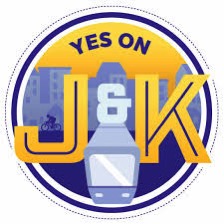
Prop J:Â Increase Sales Tax for Transportation & Homeless Services (Pt.I): YES YES YES
Prop K:Â Increase Sales Tax for Transportation & Homeless Services (Pt.II): YES YES YES
Here is a fine opportunity to paste in what I wrote for the SFLCV:
The San Francisco League of Conservation Voters urges you to vote YES on Propositions J & K. Proposition K will increase our sales tax* to 9.25% & Proposition J would allocate those funds to go to a Homeless Housing and Services Fund and a Transportation Improvement Fund.
Under these proposals, of the 0.75 cent sales tax increase, a quarter-cent will go toward homeless services and a half-cent will go toward transportation system improvements. In the first full year, those amounts are expected to be $47.75 million and $95.5 million, respectively.
In addition to needed homeless services improvements, these measures represent an important investment in our transportation services including MUNI fleet and facilities repair, new BART cars, more complete (pedestrian & bike friendly) streets, and programs like Free Muni for youth.
That said, these measures are far from perfect. Our biggest criticism is that, as this is a sales tax, Prop K is inherently regressive: poorer San Franciscans are impacted more than more affluent ones by raising the cost of everything. A far better way to fund transportation improvements is with a Vehicle License Fee (VLF) which much more fairly taxes the heaviest users of our streets and roadways with their repair and upkeep, especially because the largest portion of these measures’ increased funding will go to street repair. The SFLCV will continue to advocate for a VLF.
Housing and transit are two of the most serious issues our community faces. The SFLCV urges you to vote YES on Propositions J & K.
* Proposition K would increase San Francisco’s sales tax by three-quarters of a cent. Because a quarter-cent of the state sales tax will expire January 1, 2017 the actual sales tax rate would change from 8.75 percent currently to 9.25 percent under this proposal – on par with Oakland.
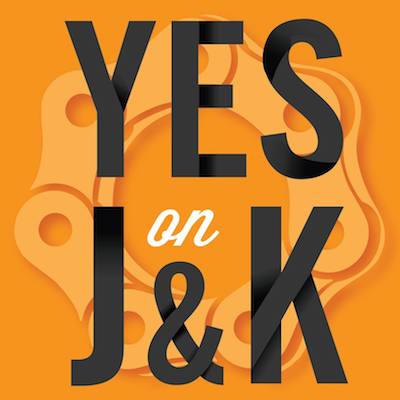
Prop L:Â Change Appointments & Budgeting for the Municipal Transportation Agency: NO
I really don’t like L. This is one of four measures I’m calling the Passel of Lame – please read the section explaining why, up here in Prop D’s write up!
Prop L contains two provisions that impact the SF Municipal Transportation Agency (which runs MUNI, parking, traffic & generally is responsible for transportation and streets in SF):
- Currently, the Mayor appoints all of the board of directors. Prop L would spilt that power between the Board of Supervisors and the Mayor, with the BoS appointing three and the Mayor four.
- Prop L would reduce the current requirement of a supermajority (7 of 11 Supervisors) to reject the MTA budget to a simple majority, thus making it easier for Supervisors to hold the MTA budget hostage for political reasons.
The first provision may be good, may be bad. SPUR makes a strong argument that it is quite bad for power balance (& I’m mostly convinced). The second one is obviously bad: by lowering the threshold for rejecting the budget, the SMFTA’s critical transportation work can once again become a political football, with critical citywide improvements and planning being held hostage to well organized smaller groups within a few neighborhoods. Transportation is a citywide system and needs to be managed as such. Vote NO.
Prop M:Â Restructure the Mayor’s Office of Economic Development & Mayor’s Office of Housing: NO
Boo. The last of the four measures that I’m calling the Passel of Lame – please read the section explaining why, up here in Prop D’s write up! This measure does essentially three things:
- Mashes together two unrelated City departments, economic development and housing, into one new department.
- Strips the Mayor of the ability to appoint the director of this department (unlike practically all other departments).
- Contains a “poison pill” clause for Props P & U, so if M passes, those two would become void.
Like all of the Passel of Lame, SPUR’s explanation of this is the BEST, and I highly encourage you to read it in its entirety – but here is an excellent excerpt that I’ll close with because it is so spot on:
Prop. M could delay the work of two of San Francisco’s most vital city agencies, those responsible for creating affordable housing and leading economic development initiatives. The nature of this work — which requires complex coordination across many city agencies — requires the directors of these departments to be close to and speak for the chief executive of the city. By removing the direct link with the mayor and adding an ill-fitting layer of bureaucracy, Prop. M would make it more difficult for the city to execute the major plans that create affordable housing, provide jobs and revitalize neighborhoods. …snip…. This measure is unnecessary and potentially very damaging to the city’s ability to do planning, support economic development and build affordable housing.
Prop N:Â Non-Citizen Voting for School Board: Yes
This is something that has been in other places and works well. It stands to reason that since there are parents with children in our schools who aren’t citizens, they should have a voice in how their children’s schools are run. Yes for fairness.
Prop O:Â Exemptions for Candlestick Point Office Development: No
My friend and colleague at the SF League of Conservation Voters, Elizabeth Stampe lays out why I recommend No on O:
Proposition O is a response to a measure limiting office development, Prop M, passed by San Francisco voters in 1986. Prop O would grant a waiver to development projects in Candlestick Point and Hunters Point, exempting them from the current citywide limit on office development (950,000 square feet per year). Prop O has been put on the ballot by Lennar, the company leading the redevelopment of the Hunters Point Shipyard. In the current economic climate, citywide, the number of office development proposals far exceeds the Prop M limit, and this would allow more development at the Shipyard, which is currently slated for 5 million square feet of office space.
Some advocates for investment in the Bayview support the measure, and we generally support investment in this under-served neighborhood that benefits existing residents.
However, part of the goal of Prop M in 1986, and a continuing goal for the city, is to make sure new development is supported with sustainable transportation infrastructure, as well as affordable homes for the people who do the jobs it generates. Prop O would fast-track office development in a place where public transit is woefully inadequate.
New jobs — and homes — should be built close to public transit in order to reduce car use and ensure the city grows sustainably. But Prop O takes limits off development with no good plan for improving transportation services for the thousands of new workers and residents in the area. There are also additional concerns around delays in community benefit payments and affordable housing development on the site, important components of sustainable development. Prop O is ballot-box planning, not a good government practice, and could set a precedent for more of the same.
The San Francisco League of Conservation Voters urges you to vote NO on Measure O.
Prop P:Â Require At Least Three Bids for Affordable Housing Projects: NO NO NO
I can’t decide if Supervisor Farrell is just inept, or he has some secret agenda with Prop. P, but in either case, its really dumb & the flaw is obvious: this ballot measure would require the City to get three bids for affordable housing projects before moving forward with them. So, what happens if only two bids come in? As the Mayor’s Office of Housing puts it in the legislative analysis, this measure could “delay or forego much-needed affordable housing.” To add insult to injury, there is no real need for this measure. To make sure we get good competitive bids – as SPUR says (in a typically great) write up “It’s unclear what problem Prop. P is meant to solve. MOHCD has competitive bid processes in place and is receiving multiple bids for most funding opportunities.” Stupid. NO NO NO. (There is a good & more detailed write up at the SF League of Conservation Voters website if you are interested.)
Prop Q:Â Prohibit Homeless Sidewalk Tent Encampments: No
Ugh. Look, homeless tent encampments are bad for everyone: the homeless, the neighbors, and even the environment. But “solving” homelessness issues at the ballot box is not “solving” – it is exploiting our collective sadness and frustration and the difficulty of this problem for political gain. Gavin Newsom did it with Care Not Cash, and now Mark Farell is doing it with tent encampments. This is just wrong.
We do not have the facilities required to humanely help these people into housing as the law requires & so this law can’t be enforced. It is also needless, in that it is already illegal to obstruct the sidewalk. More importantly, complex issues of dealing with the homeless need to be handled carefully by social workers and mental health professionals on a largely case by case basis – not by a ballot box mandate and checklist-driven process. We all deserve better. Say no.
Still here? Hang in there!  We’re in the home stretch.  Let’s take a 30 second break of my dog being cute & rambunctious, shall we?
Â
Prop R:Â Neighborhood Crime Unit: No
Neighborhood crimes like break-ins, bike thefts, vandalism and aggressive behavior are significant problems in San Francisco (and there is good data to back this up). This measure would create a Neighborhood Crimes Unit to add beat cops to City streets and also coordinate with other City agencies to address issues of aggressive panhandling and behavior. While all that is probably a good thing, it is not something we should be doing at the ballot. SPUR put it well in their excellent write up:
SPUR supports the idea of a Neighborhood Crime Unit within the SFPD. We recognize that certain neighborhood crimes, such as vandalism and bicycle thefts, degrade the city’s quality of life and can get overlooked in a police department focused on more serious or violent crimes.
But we oppose using the ballot as a tool to allocate departmental staffing. How a department carries out its functions and how departments coordinate should be decided between the mayor and the department heads (sometimes with discussion and input from supervisors or the city controller). This measure is even more troubling given that the mayor and police chief already support the idea of a Neighborhood Crime Unit, and implementing such a unit does not need legislation to be enacted. Despite some merits, this measure has no place on the ballot.
Done. No. Let’s hope a Neighborhood Crimes Unit shows up without a ballot measure…
Prop S:Â Hotel Tax Allocation for Homeless & Arts: No
This is another moderately good thing that doesn’t need to be done at the ballot. Basically, the Hotel Tax was created in 1961 and originally funded arts organizations in order to facilitate tourism. It was essentially a relatively fair system of having people who used certain facilities pay for them. Over the years the money was also spent on low income housing in the Yerba Buena area, which arguably also affected the visitor experience in SF. Since then, in 2013, due to the economic downturn, this money was reallocated to the Moscone Center & the general fund. This ballot measure would restore spending this money on arts organizations and homelessness programs. All this is good stuff is relatively fair, but this should be done at the Board of Supervisors, not at the ballot. It is a bad idea to create a set-aside at the ballot if it can easily be done at the Board of Superviors, because any later changes will also have to be made at the ballot (which is difficult & expensive). No.
Prop T:Â Prohibiting Lobbyist Contributions: Yes
My friend and colleague at the SF League of Conservation Voters, Elizabeth Stampe lays out why I recommend Yes on T:
Proposition T would restrict contributions from lobbyists to decision-makers. It bans three things:
Lobbyist contributions to those they lobby, modeled on California state law; Lobbyist bundling contributions for those they lobby (“bundling” is the practice of collecting contributions from others & passing them along to a decision-maker); and Gifts, including (to close a loophole) paying for travel through a third party. Lobbyists would also have to disclose which agency, commission, or official they’re targeting.
The San Francisco League of Conservation Voters supports good governance, and this is a measure that will help create a more transparent and democratic process for our city. Vote YES on Measure T.
Prop U:Â Change the Income Eligibility for Affordable Housing Designation : NO NO
Prop U is a thinly veiled & cynical attack on affordable housing put forward by real estate interests. Seriously, just NO. This write up by my friend and colleague, John Holtzclaw at the SF League of Conservation Voters, breaks it down: the City’s Charter generally requires developers of market-rate housing to provide affordable housing. A developer can meet this requirement in one of three ways:
Pay a fee equal to 17% – 20% of the total units being developed; make at least 12% of the on-site housing units affordable; or build new affordable units off-site, equal to 17% – 20% of the total units. A unit for sale counts toward the on-site requirement if it is affordable to households earning up to 90% of the area median income. A rental unit counts toward the on-site requirement if it is affordable to households earning up to 55% of the area median income.
The City uses federal income standards to determine the maximum allowable rent levels for the affordable units. Generally, a household living in an affordable housing unit pays no more than 30% of its total income on rent. Currently, the monthly rent for a one-bedroom affordable housing unit is $1,121, and the monthly rent for a two-bedroom affordable housing unit is $1,261.
Under Proposition U, a rental unit would count toward the affordable housing requirement if it is affordable to households earning up to 110% of the area median income, double the current cutoff. This means, a household could pay up to $2,241 for a one-bedroom affordable rental unit and up to $2,521 for a two-bedroom affordable rental unit.
As a result, developers would be tempted to rent only to households approaching 110% of the area median income to maximize their income, leaving out lower income households who need affordable housing the most.
The San Francisco League of Conservation Voters suggests NO on Prop U.
Prop V:Â Soda Tax: YES YES YES
I’m really big on this one & explained it in what I wrote for the SF League of Conservation Voters:
In 2014, 56% of San Franciscans voted in favor of Prop E, a tax on sugary-sweetened beverages. Although the tax did not meet the 2/3 threshold to pass that was required at that time, garnering the support of 56% of the voting population was a significant achievement, considering the opposition spent over $10 million to defeat it.
Then as now, the San Francisco League of Conservation Voters endorsed the tax on sugary beverages because in addition to the dramatic benefits for human health*, there are also significant benefits for the environment:
The manufacture of plastic bottles, glass bottles, and aluminum cans consumes resources, produces pollution, and the containers often enter the waste stream instead of being recycled. According to the EPA, only about 55% of aluminum cans and 34% of glass bottles are recycled. A reduction in the consumption of these beverages, combined with a switch to refillable water bottles, can lower the greenhouse gas emissions that result from the production and distribution of these beverages. A reduction in the consumption of these beverages would also reduce the demand for numerous sugar and sweetening crops, including corn, sugar cane and beet sugar. This has the potential to preserve natural habitat, reduce fertilizer and pesticide use, and to reduce transportation related impacts. In addition, the proponents of this measure intend that the funds raised by this tax also be used to encourage more public water fountains. Public water fountains are a significant way to address the water mining / equity problems that are created by shipping water-based products such as soda and bottled water from one part of the world to another. Taken together, these reasons are enough to convince us that the Soda Tax is not just good for health, but also good for the environment. Please vote YES on Proposition V.
*A recent study of Berkeley’s soda tax found that consumption of sugary beverages fell 26% (soda) and 36% (sports drinks) while consumption of tap or bottled water rose 63% since the tax took effect in March 2015.
Also, DO NOT get me started on the opposition to this measure calling it a Grocery Tax. Scumbags. GRRR.
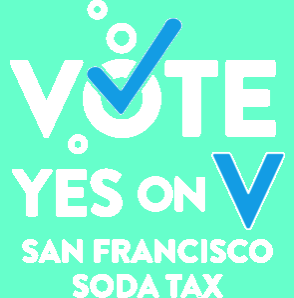
Prop W:Â Real Estate Transfer Tax: YES
This is a no-brainer: it increases the transfer tax on properties over $5 million, and increases it more the higher the value of the property. YES. DONE. (If you want to read the details, I really like the SPUR write up, even though the come to the wrong conclusion for inscrutably obtuse reasons. What’s up with that, SPUR?)
Prop X:Â PDR Building Protection : NO
My friend & colleague, Ian Wren, at the SF League of Conservation Voters wrote this up. I love the opening. 🙂
If you’re wondering why is the ballot so long this year, you could blame propositions such as this, which considers a planning ordinance that could have passed through the legislative process, but was instead punted to the voters by the Board of Supervisors. We support the intent of Prop X, which aims to protect industrial and arts spaces in the most rapidly changing parts of the City, but would prefer a legislative fix, along with the requisite outreach to impacted groups.
This proposed ordinance would impose requirements for certain developments in the Mission and SOMA, through use of conditional use authorizations from the Planning Commission. Within these areas, developers would be required to replace certain uses (e.g. light industrial and crafts, arts activities or non-profit community space), based on the size of the proposed development and the current zoning designation.
This measure does not consider whether the replacement effort would actually achieve the desired effect of retaining well paying jobs for lower skilled residents or keeping non-profits operating in the City. For instance, would the closure of a refrigerator repair shop in the Mission be replaced by a similar business or something like a drone prototyping facility able to pay market-rate rent? More likely the latter under this one-size fits all scheme. Similarly, there are few guarantees the displaced non-profits and arts centers would be able to return.
Sponsors of this proposition seemed to recognize some issues with this proposed measure and allow changes by a super-majority of the Board of Supervisors. We would prefer they make this call in the first instance, after gauging effectiveness, feasibility and desires of the local communities most affected.
The San Francisco League of Conservation Voters recommends NO on Prop X.
If you want an even more detailed discussion of the history & problems with Prop X, I highly recommend Livable City’s write up here – it summarizes things perfectly with this:
For its serious flaws and inflexibility, Prop. X ought to be rejected. But some of the problems Prop. X attempts to solve – making space for arts, production, and community institutions in Mixed-Use neighborhoods – deserve the City’s careful attention, and effective solutions. Livable City recommends voting no on Prop. X.
Prop RR:Â BART Safety & Reliability Bond: YES YES YES
100 times yes! Here is my friend and colleague, Tim Chan, breaking it down from the SF League of Conservation Voters blog:
It is no secret that BART is struggling. An aging system, coupled with enormous ridership surges, is contributing to capacity challenges and system delays. BART has identified $5B of capital investments to bring the systems into the 21st century and to meet future growth and demand.
Proposition RR will go a long way toward addressing these problems. The $3.5B bond will focus on replacing or upgrading core operational components of BART’s existing system that include new train control and signals, electrical system, track replacement and tunnel repair. Additional funds will go toward improving crowding and accessibility, such as escalator upgrades.
Currently, BART moves on average 450,000 people throughout the region every single day. When BART experiences major systemwide delays and shutdowns, that impact is felt by everyone. It is also a major contributor to the economic vitality and quality of life for the City of San Francisco and the Bay Area region. A safe, reliable transit system that is able to serve a growing population is fundamental to a healthy environment and its residents.
The San Francisco League of Conservation Voters endorses YES on Prop RR.
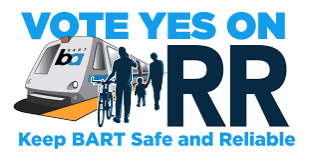
MY VALUES:
I recommend reading all of this (it won’t take that long!) to understand how I think. That way you’ll have a sense of how to asses my recommendations for yourself.
- I’m basically an idealist, an optimist, and a humanist.
- My opinions come from my experience in local politics over the past 19 years & the tons of candidate interviews I’ve done as President of the San Francisco League of Conservation Voters (SFLCV) & on the Board of Directors of the SF Bicycle Coalition (SFBC) & all the lobbying I’ve done at City Hall, etc.
- I don’t get a dime for this. I’m a software engineer by day and a political activist in my spare time.
- The three biggest “norths” of my political compass are environmentalism, social justice & good government (reform type) issues.
- While my views are definitely shaped by my activities in the SFLCV & the SFBC, my endorsements do NOT represent the views of either of those organizations.
- I use the term “progressive” a lot, as something I value. In SF, that has historically meant a combination of classical liberal Democratic politics (equity – social, gender, racial, diversity, a sense that government can & should play an important role in solving society’s problems) plus environmental values (sustainability, long-term systematic thinking) and neighborhood level populism (tenant’s rights, ethnic and socio-economic diversity, populism vs. corporatism).
- I try to be aware of my biases, here are few that come to mind:
- Poorer before richer when considering fairness issues: it’s best if something is fair, but if someone has to get screwed, make it the rich person, because society always favors the richer.
- The more money a local campaign has, the more questions should be asked of it: if a campaign has a lot of expensive media ads, mailers, and etc – why? It might be fine, but the more money, the more questions as to why.
- In some of these races it is a matter of picking between flawed options. 🙁
- Ballot measures are a REALLY bad way to govern. Most of the things done in ballot measures SHOULD be done in the normal legislature, where they are easier to fix if they turn out wrong. Another problem is that you have to boil complex issues down to yes/no votes – which rarely is a good idea. But this is what we have, so keep in mind that some good ideas make bad ballot propositions & a bad ideas can sound good in a ballot initiative because the devil is often in the details. Also note that these measures are often grey – there is often a lot of balancing going on.
- 90% of my experience & knowledge is about local San Francisco issues, so state issues are a little greyer for me unless I say otherwise. Thus, for state stuff, I try to do a lot of reading and research from the sources listed below & anything else I can find.
- Just like you, some of my opinions come from listening to those I trust, or tend to trust. Organizations like the ones listed as “bedrock” below get more credence, as well as politicians I support and believe in. Obviously this is dicey, nothing beats first hand knowledge and analysis, but that just gets us back to why I think ballot measures suck…
Sources:
My best sources are personal experiences, and interviews and lobbying I’ve done with the SFLCV & the SFBC. But the limits of this are pretty obvious. I have very little direct experience with state issues, so below are some of the sources I use & a bit on how I arrive at my endorsements.
The first source for SF stuff is the official SF Voter guide & for California stuff, the State Voter guide. I like to read the pro and con arguments and also note who is writing them, as that often tells you at least as much as what they say. Also the analysis & explanations are critical. Dig in!
Ballotopedia: A wiki for ballots & elections! This is an incredible resource! I donated & maybe you should too!
Some of my bedrock sources are:
- My own San Francisco League of Conservation Voters (of course) (SF)
- The San Francisco Bicycle Coalition (SF)
- Livable City (SF)
- The Cailfornia League of Conservation Voters (state)
- The Sierra Club (state & SF)
For state issues in particular, I really like to look at the various larger city newspapers. I know the most about the SF Chronicle‘s bias – I don’t trust them much on local stuff (they tend to be more conservative than me), but on state stuff I like to hear them out. It is also worth checking the other state papers like the San Jose Mercury News, the LA Times & the Sacramento Bee. Sadly, most of these are behind a paywall, but often you can read a certain number for free. (They should all make their endorsement editorials free as a public service.) Ballotpedia often has good links to the various newspapers as well.
I also really like reading these two slates:
- The San Francisco Bay Guardian
- SPUR (a.k.a. San Francisco Bay Area Planning and Urban Research)
Both are great, and I appreciate that they wear their biases on their sleeves. The SFBG is super progressive & occasionally rabidly so, but I tend to share a lot of their values & appreciate what they bring to the table. SPUR is decidedly centrist and good-governmenty. I particularly enjoy their commitment to sound policy, their clarity of thought, and their thorough write ups – I’d love to have the time and energy to do a slate as well as they do!
Another great slate is the one done by The League of Pissed Off Voters. I’ve never liked their name (who can sustain angry for so long!), but I like hearing what they have to say. They run this risk of getting mean-spirited and absolutist, but they do their work.
Finally, several of my friends do slates I really appreciate & there are a few others I check as well, when I find them:
- Ballot.fyi is a new one for 11/2016, and it is excellent! I hope they keep doing it.
- Kate Slate:Â My friend Kate McCarthy does an excellent job each election – hers isn’t done as of this writing, but I imagine it is coming…
- Alix Rosenthal’s slate: My friend Alix Rosenthal’s slate is always really, really well done.
Extras:
Where To Vote:
If you need to know WHEREÂ YOUÂ CAN VOTE:Â You can find your polling place in SFÂ HEREÂ or for the rest of CAÂ HERE.
Older ‘Deep Slates:
I believe I’ve been doing the ‘Deep Slate since sometime in the ’90s. You can read all the ones I’ve saved by clicking here – it gets a bit dicey because before 2012, they were email only (not blog posts), so I’ve posted the email versions I could find.
 WON

Hey Deep! I think you missed the subtle point of Prop 52. This is an existing expiring program, yes, but it didn’t need a proposition/constitutional amendment before, and it can be renewed by the legislature no matter how Prop 52 turns out. The point of the proposition/constitutional amendment is specifically to CHANGE one detail about it: the fact that in the current program, part of the relevant money ($900 million — about 10% of the amount of money involved) has been reallocated by the legislature to the general fund. The proposition would write the general practice into the constitution but remove the ability to take any of the relevant money anywhere else. That’s the reason it’s on the ballot: to tie the hands of the legislature in this particular aspect.
That said, I am personally undecided on this — on the one hand, I support having more of our budget be unrestricted to give the state more flexibility, but on the other hand, having money going to health care is also good. But it’s definitely NOT just yet another standard “renew something expiring” proposition.
Thanks David! Interesting. I gave you a shout out above & updated. Thanks! I’m now going to go read your guide 🙂
Really appreciated having the chance to read your thoughts on a few of these. Thanks for posting!